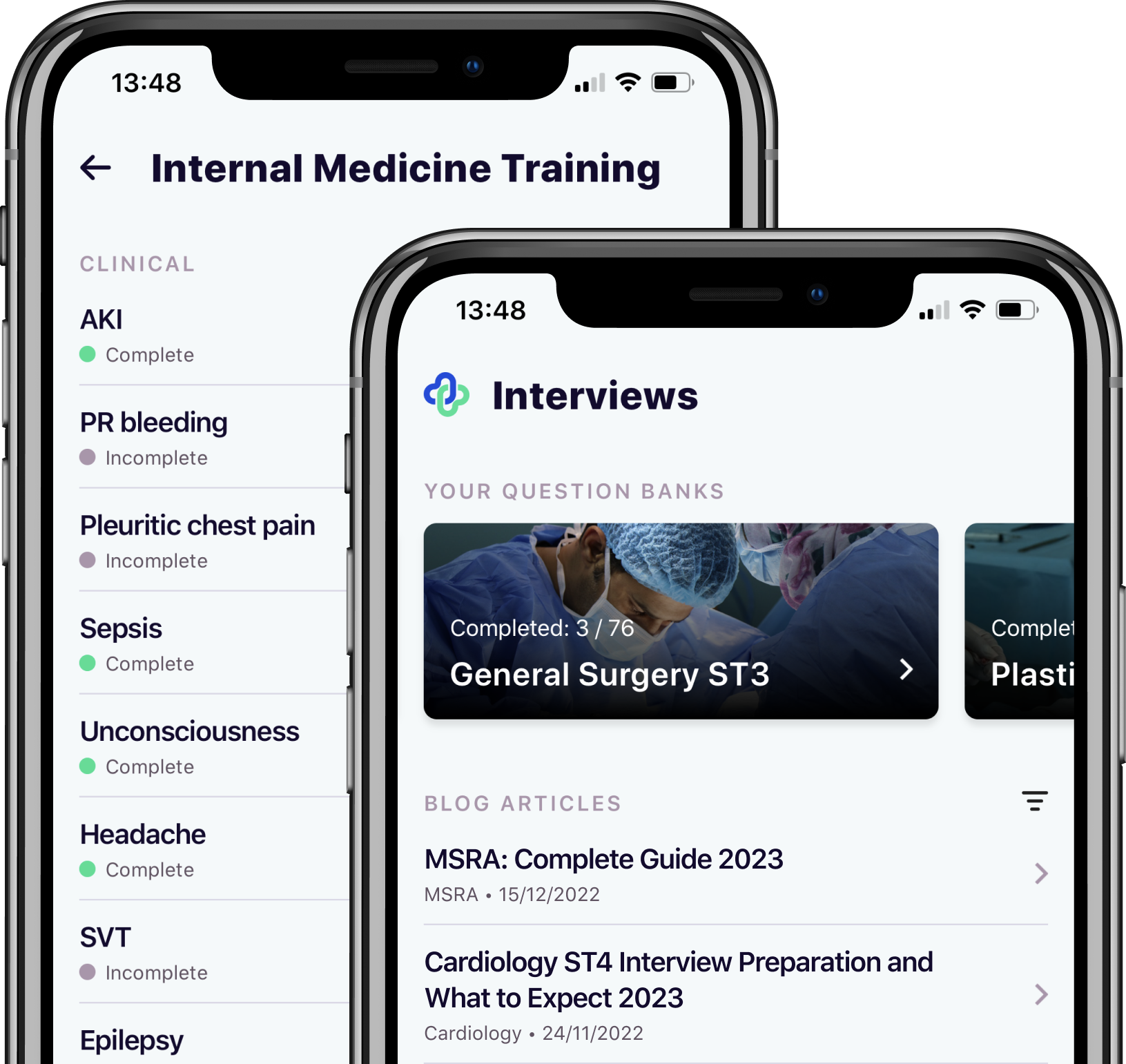
How to maximise points in the 2024 Internal Medicine Training (IMT) Application
For 2024, there are a total of 40 points on offer in your Internal Medicine Training application. This is a decrease from previous years, as a result of changes to the points which were introduced last year. With only a few points between candidates, an extra point can make a significant difference to the outcome of your interview.
As you sit down and start thinking about your application, it’s worth knowing what’s going to get you points (which will get you that interview) and how to maximise your points in each area. There will be seven sections in total, and we will go through each section here.
“The best possible choice I could have made, nothing could have prepared me better in a short period of time and I secured my 1st preference.”
How can I maximise my points in my Internal Medicine Training (IMT) application?
Section 1: Postgraduate Degrees and Qualifications
The scoring is straightforward and relates to your final mark. Make sure you have your degree certificates in your portfolio!
Postgraduate degrees and qualifications scoring:
| Option | Score available | Notes |
|---|---|---|
| PhD or MD by research (can include non-medical related qualifications) | 4 | You undertook research involving original work, usually at least two to three years’ duration, and ideally resulting in one or more peer-reviewed publication.
A majority of the time during the period should have been dedicated to research rather than clinical training. To score yourself for an MD it should meet the UK definition of an MD: “A supervised research degree for students already registered with the General Medical Council, is studied full time over 2 years or 4 years part time awarded a doctorate if your thesis is judged to represent an original contribution to knowledge in your chosen area.” |
| Masters level degree eg MSc, MA, MRes, etc. (can include non-medical qualifications). Typically lasts 8 months or longer, full-time equivalent. | 3 | This must be a specific course that usually lasts for three university terms (or equivalent) and is eight months’ or more duration (full time equivalent); it must not be claimed for upgrading a bachelor’s degree without further study as is offered in some universities.
You can claim this option for an MD (by teaching, usually including a dissertation) where a substantial amount of time was spent in clinical training and being taught; the dissertation is a smaller part of the programme, not usually involving new research. |
| Other relevant postgraduate diploma or postgraduate certificate typically lasting between one and ten months (whole-time equivalent).
You cannot claim for any membership examinations, or parts thereof, from within or outside the UK; this includes the MRCP(UK). Qualifications unrelated to medicine cannot be claimed for in this option. |
1 | This option is for relevant postgraduate courses / modules – eg diploma of tropical medicine and hygiene.
It is not permissible to claim points for partially completed qualifications – eg 1 year of a three-year degree. In addition to not being able to claim for the MRCP(UK) in this section, you also may not claim for other specialties’ membership examinations (eg MRCGP) or any similar qualifications from outside the UK (eg MRCP Ireland, FCPS Pakistan). |
| None/other: please specify | 0 | This space is for you to mention anything which you think is of relevance, but which cannot be categorised above.
Please note that entries under this option do not gain marks at the application stage, but may be one of the factors taken into account by interviewers when deciding upon their interview scoring. |
Remember, you are not allowed to score intercalated degrees in this section. Make sure that if you score in this section, it is only for a postgraduate qualification. At this point, if you don’t have it, it’s unlikely that you will, but don’t worry, the number of marks has been significantly reduced, and you can pick them up in other sections!
Section 2: Additional Achievements
This section was previously labelled Prizes/Awards and relates to awards and prizes obtained during medical school or after graduating. These can be challenging to achieve in a short space of time if you do not have them already. Potential areas include:
- Essay competitions from medical societies. These often have poor submission figures with less competition than you may think. Submission details are easy to find with a quick search on Google.
- Conference poster or presentation prizes – try to commit to as many as you can but consider:
- Small conferences or regional meetings may be less competitive to win prizes, while larger meetings may offer a range of prizes – have a look at what is offered!
- Prizes related to Quality improvement projects/ audits (can score points in multiple categories with one project).
| Option | Score available | Notes |
|---|---|---|
| High-achievement award for primary medical qualification (eg honours or distinction) awarded to no more than the top 18% | 3 | If more than 18% of the year receive honours/distinction etc., then it no longer marks you out as exceptional in this category. |
| Awarded international/national prize related to medicine | 2 | This means that the prize is open to medical undergraduates and / or postgraduates in the country of training. |
| One or more prizes / distinctions / merits related to parts of the medical course awarded to no more than the top 20% | 1 | You may only claim this if you were in the top 20% of marks for part of the course on at least one occasion. |
| None/other: please specify | 0 | This space is for you to mention anything you think is of relevance which cannot be categorised above.
Please note that entries under this option do not gain marks at the application stage, but may be one of the factors taken into account by interviewers when deciding upon their interview scores. |
Evidence would normally be a letter or certificate from the medical school or organiser confirming the award.
This list also includes people who received honours for their medical degree. Now you may think you don’t score here, but it’s definitely worth digging out a copy of your medical degree transcript and looking at all your marks over the five years. If you scored a few merits in a few exams, then highlight it and get it in your IMT portfolio, as you can score points for: ‘top 20% of marks for the part of the course on at least one occasion’!
The number of points on offer has been reduced for 2024 entry, compared to previous years, before the 2023 changes mentioned above were introduced. If you don’t have anything which fits the criteria, try and put something into the final category. When examiners were unable to interview people during the pandemic years, these sections were reviewed and used to determine the internal medicine training interview score, so see it as a backup, just in case.
Section 3: Presentations/Posters
This section is separate to Quality Improvement, so don’t include posters you have presented for QI projects (unless you have two). If you’re struggling here, now is the time to go and talk to your supervisor about what projects they have coming up and whether you can help with an abstract submission for any conferences on the near horizon. You don’t have to present, but get your name on the poster and you get the points.
Many applicants are unaware of the low rejection rates for posters in small conferences, particularly regional and national. It can be much easier to get accepted than you think. Have a look through the list of medical specialities on the RCP website. Each specialty will have a society or organisation responsible for setting up and running conferences, and you will likely find a range of upcoming opportunities to present your work!
| Option | Score available | Notes |
|---|---|---|
| An oral presentation in which I was a first or second author was given at a national or international medical meeting | 7 | National means that participation is routinely extended to, and accepted by, anyone in the country; as implied, international means participation extends beyond this |
| A poster in which I was a first or second author was shown at a national or international medical meeting | 5 | National means that participation is routinely extended to, and accepted by, anyone in the country; as implied, international means participation extends beyond this |
| An oral presentation in which I was a first or second author was given at a regional medical meeting | 5 | Regional means that participation is confined to, for example, a county, medical training region, health authority, or a recognised cluster of hospitals, extending beyond a city. |
| An oral presentation in which I was a first or second author was given at a local medical meeting | 2 | Local usually means participation is confined to a local hospital or university setting. |
| A poster in which I was a first or second author was shown at a regional or local medical meeting | 2 | See the options above for notes about what regional/local entails. |
| None/other: please specify | 0 | This option can be used for anything else you think is relevant that cannot be categorised above, including presentations not yet delivered.
Please note that entries under this option do not gain marks at the application stage, but may be one of the factors taken into account by interviewers when deciding upon their interview scoring. |
Some things to consider when completing this section:
- If you were a significant contributor (usually first or second author) to a presentation/poster but did not personally present/show it, you can still claim the points as if you had presented.
- If you were due to present a poster or oral presentation which was cancelled due to the COVID-19 outbreak, you may claim the points as if you had attended and presented. You should provide evidence that your work was selected for presentation, the event was cancelled due to COVID-19, and you must still provide evidence of your work, e.g. poster, abstract, PowerPoint presentation, etc.
Examples of evidence include: a certificate or letter confirming the invitation and/or delivery of the presentation/poster, an abstract submitted to the organiser, and inclusion in the abstracts book for the meeting.
Section 4: Publications
You score the most IMT points for being first author on one or more PubMed cited papers, but points can be picked up for any publications you have been involved with, so hang on to them and get them in your portfolio. If you don’t have any, then talk to your consultant about writing a case report, as these pick up points too. You could even write a piece for a journal, such as a conference review, as this still scores! Be prepared to talk about any publications that you include.
If you’ve presented work at conferences in the past, have a look to see if the abstract was published. You should have been informed of this at the time, but you may have missed it, and it scores you 1 point!
| Option | Score available | Notes |
|---|---|---|
| I am first author, joint-first author or corresponding author, of one or more PubMed-cited original research publications (or in press) | 8 | |
| I am co-author of one or more PubMed-cited original research publications (or in press) | 6 | |
| I am first author, joint-first author, corresponding author or co-author of more than one PubMed-cited other publication (or in press) such as editorials, reviews, case reports, letters, etc | 5 | |
| I have written on or more chapters of a book related to medicine in its broadest sense (this does not include self-published books) | 5 | This refers to medicine in its broadest sense and not just hospital medicine. Books must be published by an independent publishing house, ie not self-published |
| I am first author, joint-first author, or co-author of one PubMed-cited other publication (or in press) such as an editorial, review, case report, letter, etc | 3 | |
| I have published one or more abstracts, non peer-reviewed articles or published articles that are not PubMed-cited | 1 | |
| None/other: please specify | 0 | This option can be used for anything else you think is relevant that cannot be categorised above, including things not yet accepted for publication.
Please note that entries under this option do not gain marks at the application stage, but may be one of the factors taken into account by interviewers when deciding upon their interview scoring. |
Section 5: Teaching
Teaching is split into two sections: ‘Teaching experience’ and ‘Training in teaching’. The points in the first section are gained for showing that you can develop and deliver your own teaching program and are split as follows:
1 point – Teaching medical students or other healthcare professionals occasionally. All internal medicine training applicants should have this, and it can be done by volunteering to do a departmental teaching session or a teaching session for medical students. Many hospitals also offer twilight teaching sessions for students, which you can get involved with. Don’t forget to get your certificate!
3 points – Teaching medical students or other healthcare professionals regularly > 3 months. As above, this is a very achievable goal and easy to evidence with certificates and student feedback!
6 points – Worked with local tutors to design and organise a teaching programme (a series of sessions) to enhance locally organised teaching & provided teaching for 3 months. You need to demonstrate that you have liaised with other tutors to implement new changes into a teaching programme (you don’t have to design the program yourself). Contact the education leads for medical students in your hospital or the education leads for the different nursing or AHP departments; they will be happy for the help, and you will score easy points.
Examples of teaching programmes include:
- Structured bedside teaching
- Clinical skills in early years
- OSCE preparation +/- examination
- Communication skills workshops
How can I set up a program?
- Start as early as possible, e.g. in induction week.
- Briefly plan a program, e.g. session titles, audience, setting, teaching style, teachers, e.g. other colleagues/ junior doctors.
- Discuss the plan with your education supervisor during the first meeting, as they may be able to assist.
- Discuss with the medical education department and arrange meetings with the head of medical education to discuss your proposal.
- If approved, you will need to plan the program in more detail.
- Following this, the medical education department will usually email junior doctors asking for volunteers to prepare and deliver teaching based on your topics, offering certificates and formal feedback.
| Teaching experience | ||
|---|---|---|
| Option | Score available | Notes |
| I have worked with local tutors to design and organise a teaching programme (a series of sessions) to enhance locally organised teaching for healthcare professionals or medical students. I have contributed regularly to teaching over a period of approximately three months or longer. I have evidence of formal feedback | 6 | You have identified a gap in teaching provided and have worked with local tutors to design and organise a teaching program, and arrange teachers. You have a certificate or letter of recognition of your contribution. You have evidence of formal feedback from these sessions, or a ‘Developing the Clinical Teacher’ / ‘Teaching Observation’ form. |
| I have provided regular teaching for healthcare professionals or medical students, as part of a defined programme/course, over a period of approximately three months or longer. I have evidence of formal feedback. | 3 | For example, regular bedside or classroom teaching, acting as a mentor to a student or acting as a tutor in a virtual learning environment. You have a certificate or letter of recognition of your contribution. You have evidence of formal feedback from these sessions, or a ‘Developing the Clinical Teacher’ / ’Teaching Observation ’ form. |
| I have taught medical students or other healthcare professionals occasionally. I have evidence of formal feedback | 1 | Occasionally means less than the approximate three months for higher scoring options but should be at least three sessions. You have evidence of formal feedback from these sessions, or a ‘Developing the Clinical Teacher’ form. |
| None/other: please specify | 0 | This option can be used for anything else you think is relevant that cannot be categorised above.
Please note that entries under this option do not gain marks at the application stage, but may be one of the factors taken into account by interviewers when deciding upon their interview scoring. |
Training in Teaching
Whilst achieving higher qualifications in teaching before the IMT interviews (maximum points) may not be feasible, scoring 1 point for brief training in teaching (online modules or in person) is definitely achievable. There are plenty of online courses available. You might find it useful to look at our Teach the Teacher course or our complete guide for more information.
| Option | Score available | Notes |
|---|---|---|
| I have been awarded a masters level teaching qualification. | 3 | This could be full time over one academic year or part-time over multiple years. |
| I have a higher qualification in teaching eg PG Cert or PG Diploma. | 2 | |
| I have had training in teaching methods which is below the level of a PG Cert or PG Diploma. | 1 | This should be additional to any training received as part of your primary medical qualification. |
| I have had no training in teaching methods. | 0 |

Teach the Teacher Course by Medibuddy
This two-day CPD-accredited online course will earn you 12 CPD points on completion. It’s entirely flexible, so you can complete it in two days or multiple sessions over a longer period. On completion of the course, you’ll receive a certificate for your portfolio that is accredited for CCT, interviews and appraisals.
Find out moreSection 6: Quality Improvement
Getting full marks here should be straightforward. Remember, for higher specialty training, the scoring system is the same. Any QI project you start now, keep it going and you’ll score maximum marks at your next application too.
You can design a QI project tomorrow – follow the PDSA Methodology and complete three cycles, analyse the data and demonstrate this, and you’re done. It will look better when it comes to interview if you have presented it at a regional or national meeting/conference, but ultimately this does not affect the points on offer, which are simply for demonstrating how you participated/led the project and how you interpreted the data. Be clear about what changes you have implemented.
Presentation of the project, however, is no longer essential, given that not all QI works need to be presented, but it does make you look good!
The main point is how you evidence your involvement. This can be in the form of the poster or abstract you wrote after the project, or by a letter from your consultant outlining your role in the project!
| Option | Score available | Notes |
|---|---|---|
| Involvement in all stages of two cycles of a quality improvement project | 5 | For example you participated in all stages of a PDSA cycle (or similar) as well as a further cycle consisting, as a minimum, of data collection and analysis.
Involvement in a project where a change/act/action step has not been carried out but only suggestions for change created/presented does not constitute involvement in all stages. Presentation of a project is not an essential stage as not all QI work requires presentation. It is likely that this involved working as part of a team but you must evidence your own role within the QI activity for all stages. |
| Involvement in some stages of two cycles of a quality improvement project OR involved in all stages of a single cycle of a quality improvement project. | 3 | For example you were involved in data collection/analysis for two cycles of a QI project but not the change and/or planning stages.
You participated in all stages of a PDSA cycle or were involved in planning, data collection, data analysis and change. Involvement in a project where a change/act/action step has not been carried out but only suggestions for change created/presented does not constitute involvement in all stages. Presentation of a project is not an essential stage as not all QI work requires presentation. |
| Involvement in some stages of a single cycle of a quality improvement project | 1 | For example you were involved in data collection and analysis or a project that didn’t implement any change. |
| none/other: please specify | 0 | This option can be used for anything else you think is relevant that cannot be categorised above.
Please note that entries under this option do not gain marks at the application stage, but may be one of the factors taken into account by interviewers when deciding upon their interview score. |
Section 7: Leadership and Management
This section refers to roles related to the provision of healthcare or a non-medical voluntary capacity.
The points are scored for being a trainee representative on a committee, and the number of points on offer goes up depending on the level of the committee. Being on national committees scores the most, but of course, not everyone can do that. Put your hand up when they ask for local training reps or members for the Junior Doctors Forum, and you’ll score points here that others won’t! Just remember to get your letter/certificate as evidence.
Leadership roles that you can score IMT application points for include:
- Trainee rep: This is potentially an easy point. Consider applying for this position if available at your trust during induction.
- FY2 representative: If not available, you may suggest this should be a position.
- Role in the doctor’s mess: This is probably the easiest point in the portfolio and something to apply for during induction. You may just organise drinks once a month, but this is worth points!
- Rota Coordinator: Ask your consultant or registrar if you can help with this. They will be delighted!
Evidence of Leadership Development and Management Courses sadly won’t score you points but are good things to include and will be great to talk about.
| Option | Score available | Notes |
|---|---|---|
| I hold/have held a national/regional leadership or managerial role for 6 or more months and can demonstrate making an impact | 4 | Examples include: BMA national executive, trainee representative of a specialist society or college or a nationally held leadership and management fellowship. Charity, scouting/guides, sports, creative arts at a national level. |
| I hold/have held a local leadership or managerial role for 6 or more months and can demonstrate making an impact | 2 | Examples include a role within one hospital or medical school such as junior doctors’ mess president or trainee representative on a hospital committee. Charity, scouting/guides, sports, creative arts at a local or regional level. |
| None/other: please specify | 0 | You can use the space to mention anything which you think is of relevance that cannot be categorised above. This includes those not meeting the minimum time duration.
Please note that entries under this option do not gain marks at the application stage, but may be one of the factors taken into account by interviewers when deciding upon their interview scoring. |
Think about how you might evidence this section. This could be a letter from a consultant confirming your role or evidence showing your title on headed paper from the organisation. Evidence can even be formal feedback from colleagues about your time in the role! Think about what you have, and if you don’t have it, go and ask for it!
All of these sections will have areas where you can score, where at first glance, you might not think you can. Spend some time reading the guidance from the JRCPTB found here, before putting together your application. Your educational or clinical supervisor is also a really good person to ask for advice when preparing your application.
All tables are taken from the RCP document ‘Changes to the application scoring matrix for PSRO-coordinated recruitment from 2023′ and are available freely here.
Once you have secured your interview, we have a whole host of resources to help you prepare, including our IMT Interview Question bank, written by previously high scoring applicants, that will provide you with interview questions to prepare.
Good luck!
Further reading:
Internal Medicine Training (IMT) Interview Question Bank
Internal Medicine Training (IMT) Points
Internal Medicine Training (IMT) Interview Tips
Check out all our Internal Medicine Training (IMT) Interview Resources.

Take your subscriptions with you
Our mobile app allows you to access your interview and exam question banks wherever you are.






